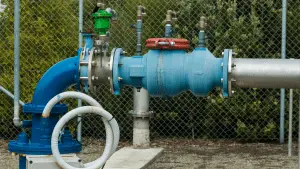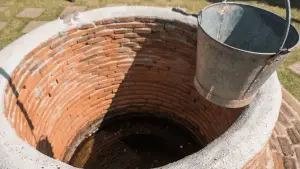As if we didn’t have enough to worry about in life, we are starting to question the quality of our drinking water. And not only that, but so many cities and towns have water bans that limit how much and when you can use your water.
Is a well the answer? Is well water better than city?
As you will see when you read on, it is not so cut and dry.
I know I sound wishy-washy by saying that it depends on a lot of factors, but it is the truth.
That’s why I wrote this article to give you food for thought on the pros and cons when you weigh the differences between public water supplies and having a well.
After reading this article I think you’ll be able to make an informed decision armed with the right information.
Is Well Water Safer than City Water?

Well water generally requires less treatment than city water so as a result has fewer chemicals. These chemicals are generally safe to drink, but many people would rather drink natural and chemical free water.
As far as contamination goes, well water is generally regarded as being safer to drink since there is a more direct line from its pristine state into your house.
Now, city water is generally safe to drink in any part of the country as it is constantly tested, but one thing that greatly affects the quality are the pipes in the system. In some cases, these pipes are corroded and can bring lead and other contaminants to your house even if the source of the water itself is safe.
Check It Out!
If you want to know “is well water bad for you?” then check out the full article about how safe well water is to drink.
This was the problem with Flint Michigan. It wasn’t that the reservoir was contaminated, but the pipes were and combined with insufficient treatment this lead to the crisis that is still ongoing at the time I write this. (Source).
Even with a well being safer than city water, you do need to test it frequently to make sure it is actually safe. There are a number of at home tests that will not break the bank so you can use those once a year to check that you don’t have any problems. Considering how many contaminants they can test for they are a bargain. This one from Amazon tests for bacteria, heavy metal, pesticides and more and the price is more than reasonable as you can see by clicking the link.
The More You Know!
When you have a well, then you really need to have a filter. Whether it is for your whole house, countertop or under your sink you need to purify your water before you drink it. I wrote a detailed article about the best filters for well owners so make sure you click the link to read more.
Benefits of Having a Well vs City Water

There are many times when it pays off having a well instead of public water. So in this section, I will highlight and then go in depth about the advantages.
- Bypass any water bans
- Less affected by a natural disaster
- No chemicals in the water
- No monthly water bills
- There is a possibility of adding property value
- Well water can taste better and be better for you
Now let’s go over each of the advantages one by one.
Water bans/Natural disasters
Droughts are becoming ever more frequent in many areas. On the other hand, floods are also increasing in frequency.
When you have a well, many times it is not as affected as city water if there is a lack of water. This is especially true in the case of artesian wells.
Water your lawn and garden whenever you want when the rest of the city has to restrict how much and when they use their water.

If there is a disaster like a flood, or if there is a massive case of contamination, then, for the most part, you are still going to be able to drink your well water.
No chemicals
It isn’t a bad thing that city or county water gets treated. It’s far better than having thousands of people get sick from pathogens or other pollutants. I live in a city north of Boston and the smell of the chlorine from the water is like nothing I’ve ever dealt with before.
It tastes and smells awful. My wife complains that it dries out her hair and skin. (I’m bald and Italian so I never need to worry about my hair or skin getting dry!) And, I just don’t think it’s healthy overall to be drinking these chemicals.
Before moving here, I lived in a house with a well and it always tasted better, had a nice soft texture and it never affected my hair or skin. It was natural and came out of the tap so cold and refreshing.
No monthly bills
This is only partly true. You won’t be getting any water bills, but you will be paying electricity bills from the pump in the well. And it isn’t without expenses either, but I will go over those when we talk about the disadvantages.
In case of a power outage, here’s how to power a well pump with a generator.
Increased property value
This is not something that is true across the board, but it is something that many people may encounter.
If you live somewhere with water bans and iffy public water then this is a great selling point for your home. Also if you have a large area to irrigate or landscape then this is another positive as it will save money with lower water bills.
Disadvantages of Well Water

Though my personal opinion and experience are that well water is better than having city water, there are some cons to having a well.
Here are some negative aspects that may affect your decision to put in a well.
- Needs regular testing
- Can be contaminated by bacteria
- May need maintenance
- You won’t have water if your power goes out
- You’re paying for any problems with your water
Once again, we will go over each point in more detail.
Testing your well
City water is tested often at no cost to the consumer, but that is not the case with well water. You will need to be testing your water once a year for contamination.
You should be testing for things like coliform bacteria to make sure that your water is safe to drink. I wrote up a very detailed article about testing for coliform bacteria and what it means. With issues like E Coli and worse that could be lurking in your well water, it is worth checking that article to get all the information on what you could be looking at when it comes to the risks of contamination.
If you do find bacteria or other pathogens in your well water, you’ll need to shock it to disinfect. Read a step by step guide to shock chlorinating your well to see what it’s all about.
Possibilities of contamination
If you happen to live anywhere near a pig farm or any industrial farm, you could be getting surface contaminants into your well. Even if you think it is sealed, it may be allowing bacteria in. If there is a flood, then this can also affect your well if the water goes over the cap and it isn’t as sealed as you had thought. And, many people with well water also have septic systems on the property which also increases the risk of contamination.

Now, city water has a high chance of getting contaminated in these cases, too, so this one kind of comes in at a draw, but it is something to be aware of as a possibility.
Read More!
You should be checking for things like arsenic as well. Click here to read about the best tests for arsenic to make sure your well water is safe to drink.
Maintenance
A well is not a set-it-and-forget-it type of system. At the very least, you will need to do an annual check-up to make sure the well is operating properly. Without getting too deep into the ins and outs, you should hire a pro to come out once a year and take a look at your well.
Service also needs to be done by a professional so that you’re not making the problem worse by doing it yourself.
Well Pump needs power
In case of a blackout, you won’t have water as you would in the case of city water. You get your water into your house by way of an electric pump.
Now, you won’t die of thirst if you do lose power if you have a generator, but what happens if this is a prolonged blackout? Or if there is a natural disaster that makes it difficult to get fuel for a generator?
There are hand pumps that you can use to pump out your well water as long as you have plenty of elbow grease. But, those old fashioned pumps with the arms only work on shallow wells.
I checked out this newer style one on Amazon and was surprised at how deep you could pump water out by hand. Then there are solar powered pumps also available on Amazon. The prices are rather shocking for either version, in my opinion anyway.
In any case, there are options so it isn’t too big a negative.
Can get costly
With any problems with your city water, the town or county has to pay to remedy the situation. When you have a contaminated, damaged or empty well, then you are responsible for the costs to test it and fix it.
Switching to City Water from Well Water

If you are buying a house with well water and are starting to have second thoughts about having a well. Or, maybe the well in question is not in good repair and you don’t want to pay to restore it, then you can switch to city water.
Whatever your reasoning, you can connect to city water but first you will need to connect with the city in question.
You may already have the pipes coming in from the street, but the most important thing is to have the well and city water pumps completely separate. Many cities also forbid the use of check caps, so when I say separate I mean they cannot connect at all.
The public water will need to be connected after the pressure tank.
You can keep your well for outside use if you wish though which will also bypass any water ban restrictions.
Before connecting to the city supply, I would want to find out a few things about it. Is it soft or hard water? What is the pH? What chemicals do they use to treat it and what are the quantities? And, especially I would want to find out how much it costs monthly to be on the public supply.
How much does it cost to connect to city water?
For the answer, we are assuming that there is a water main running directly outside of your property and not down the street. Expect to pay anywhere between $60 and $150 per foot of water main needed. If your house is located far from the main, this can be significant.
There are permit costs and then costs for the plumber to install a meter, plus the cost of the meter. All told, it can range between $1500 and $3000. I want to stress again that this can vary wildly depending on where in the country you are and what your local town regulations are.
Final Analysis
I don’t think there is a clear cut winner in the well water vs city water debate. They each have their pros and cons.
My personal opinion is that if you can get well water, then I would recommend it over city water.
I think then when you have full autonomy over your own resources then that is the best way to go.
But, that is my opinion. After reading this comparison between county water and well water you may have come to a different conclusion.

Nick Lopresti is the founder of YourH2Home and a home improvement expert. He has years of experience writing about various home improvement topics, mostly as it pertains to water systems.
